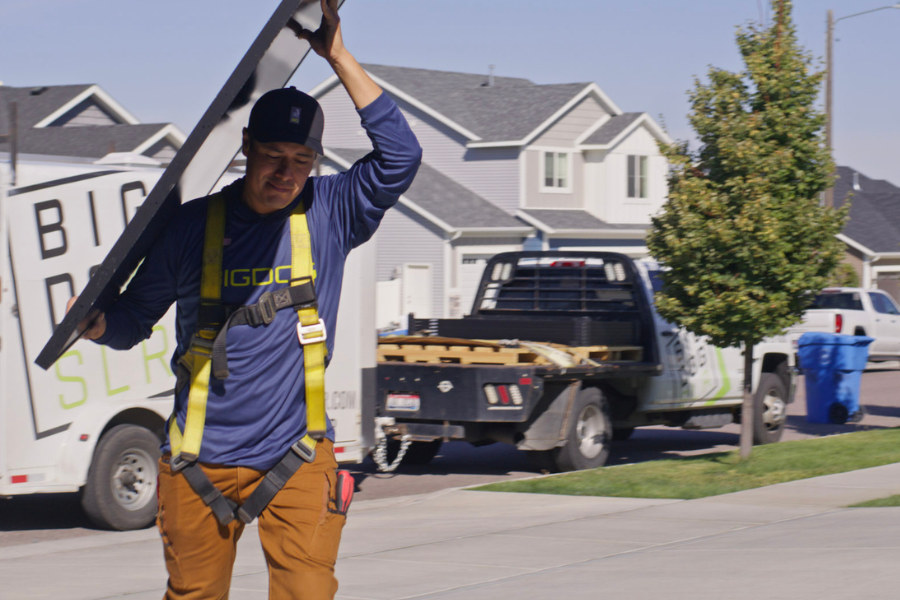Perhaps you are like many other Americans who, for whatever reason, want or need to live completely on your own, disconnected from the rest of society as a whole. In other words, “off-the-grid."
There could be a number of reasons that being off-grid is important. You may have a remote residence, such as a cabin that does not have adequate access to public utilities without extremely high costs.
Perhaps you have past experiences that make you hesitant to “tie-in” to the public utilities and rely on them for power. Or, maybe you have some well-founded questions and fears about the future security of the power grid.
Whatever the case may be, building an off-grid-solar system provides an excellent alternative energy source with complete independence.
⚠️ Important Note ⚠️
We do not currently offer off-grid solar. The goal of this article is to help you understand some of the benefits and drawbacks of off-grid solar. If you decide not go with off-grid, then we share the second best alternative.
Table of Contents
Off-Grid Solar
In order to be completely self-sustaining, and independent of a utility company, you need utilize a natural and environmentally-friendly source of power such as the sun.
The sun’s power can be collected and used through solar photovoltaic modules, or solar panels, which can be installed as a roof mount, ground mount, or elsewhere.
There are different types of solar panel systems, however, if you want to be completely self-sustaining in terms of power, your best option is to install an off-grid solar power system.
Off-Grid Solar Power Systems
Off-grid solar systems are powered by energy from the sun, which energy is collected through solar panels and is then taken to an inverter, which then transfers the energy into usable energy. The power collected through the solar panels is then stored in batteries, which can then be used to power all your home needs.
The best thing about off-grid solar power systems is that you are able to be completely energy independent from a utility company because you are not at all connected to the grid, and instead use the battery back-up as the primary source for all your power needs.
Totally Independent Power Source System
Most everyone is already connected to the grid and because of that they are completely dependent upon the utility system for power, so in case of an emergency or power outage, they are stuck without power and have to wait for the utility company to fix it before they will have power again.
Even if you have a grid-tie solar system, the use of your energy is still dependent on the utility company being active and running. That is unless you have a solar system with battery backup. You do not have to be stuck without power in such a case.
You can have peace of mind and can have the security of being independent of the utility company if you have an off-grid solar system.
Related post: What is Active Solar Energy?
Looking to Install an Off-Grid Energy System?
This can sometimes be the only option for some people. This is not an option that we offer currently at Big Dog Solar. We would recommend you to some other businesses to get an off-grid solar systems. There are also some DIY options if the type of system that you need will be smaller.
The Best Alternative to Off-Grid Energy
Grid-Tied solar with a battery backup is the next best thing compared to off-grid solar. These systems are the Van Halen's of the solar world - the best of both worlds.
Grid-tied battery backup systems are connected to the grid, which allow you to take advantage of net metering. However, you also have a back up solar battery. This system uses a grid tie inverter to send your extra energy to the battery backup. It can then be used during power outages, or when the grid goes down.
With a solar energy system, you can eliminate stumbling around in the dark. No more searching for candles and matches that you put in a "safe place" for power outages.
Here’s the bottom line:
The primary difference between these solar systems is how they connect to the power grid. Off-grid systems function separately from the grid, while grid-tied systems rely on it for backup power. Off-grid systems are ideal for remote areas where connecting to the grid is not easy to do. Grid-tied systems are useful in areas where outages happen a lot.
Off-Grid Solar vs Grid Tied Solar with Batteries
Off Grid Solar System

One benefit of an Off-Grid Battery Backup system is that it offers complete energy independence from the grid. This is especially important for people who live in remote areas or for people who experience unstable grid connections.
When you have an off-grid system, you don't have to rely on the utility company for power. This means that you have complete control over your energy usage. Additionally, off-grid systems can help reduce your carbon footprint, as they rely solely on renewable energy sources, aka the sun! That being said, these benefits come at a cost.
Off-grid systems are typically more expensive, because they require a larger battery bank and other equipment to function. They also require more maintenance and monitoring. This is because you are in charge of making sure your battery bank is charged and maintained.
Another drawback of off-grid systems is that they may have limited power supply. Unfortunately, that means you may experience power limitations during times of low sunlight or high energy demand. This means that running large appliances or powering amenities isn’t the most feasible.
You may have recently purchased a large hot tub or you have built the woodworking shop you have always wanted. Now you're considering an off grid solar power system to offset the costs of powering them. As fun as that would be, it probably wouldn't be the best choice because of the limitations of these systems.
Grid-Tied with Battery Backup Solar System

Grid-Tied Battery Backup systems are connected to the grid, but they also have a battery backup. This means you still have a backup power source when the grid goes down.
This makes them a popular choice for those who experience frequent power outages. That's because they offer a cost-effective solution to energy backup during those situations.

Mitch Workman, the Director of Marketing at Big Dog Solar, shares: “I have a grid-tied with battery backup system. I chose the battery backup system for the peace of mind that comes with it. I still have power even with outages and storms, and it actually has come in handy.”
The Office of Energy Efficiency and Renewable Energy shares these four main benefits to having a battery backup:
- Around the clock power
- Pocketbook protection
- Better monitoring
- More energy self-sufficiency
And again, grid-tied systems with battery back up allow you to take advantage of net metering. This can help further offset the cost of your electricity bill.
That being said, nothing is perfect, and they do have some limitations. Grid-tied systems with battery back up still rely on the grid for power, so they cannot offer full self-sufficiency. They have limited battery capacity, so if the outage lasts for a long time, your backup power may run out.
Make a Good Decision About Solar
Our goal is to give home and business owners the information they need to make a good decision about solar.
We want you to feel confident about which system type you choose, understanding the financials, and picking a good company to go with.
We maintain long relationships with our clients, and back our work with warranties. If we recommend solar to someone who isn't a good fit for it, we'll end up losing money and time.
It's in our best interest to help you make a good decision about solar. If you want to know how well your home might be suited, we made a quick solar score assessment that you can take to find out if it's a good idea or not!
Q&A
What is an off-grid solar power system and why might I need one?
An off-grid solar power system uses solar panels to generate electricity, which is then stored in batteries for use. This system is ideal for remote locations without access to public utilities or for those seeking complete energy independence. It allows you to be self-sufficient and not rely on the utility grid.
What are the main advantages and disadvantages of off-grid solar systems?
Advantages of off-grid solar systems include complete independence from the grid and a reduction in your carbon footprint. However, they are typically more expensive, require more maintenance, and may have limited power supply, especially during periods of low sunlight.
How does a grid-tied solar system with battery backup differ from an off-grid system?
A grid-tied solar system with battery backup is connected to the grid and provides backup power during outages. It allows you to take advantage of net metering and typically costs less than off-grid systems. In contrast, off-grid systems are completely independent of the grid and rely solely on solar and battery power.
Why might I choose a grid-tied solar system with battery backup over an off-grid system?
A grid-tied solar system with battery backup offers the benefits of net metering and provides power during outages, making it a good option for areas with frequent power interruptions. It also tends to be more cost-effective than off-grid systems while still offering backup power and some energy independence.




.png)








